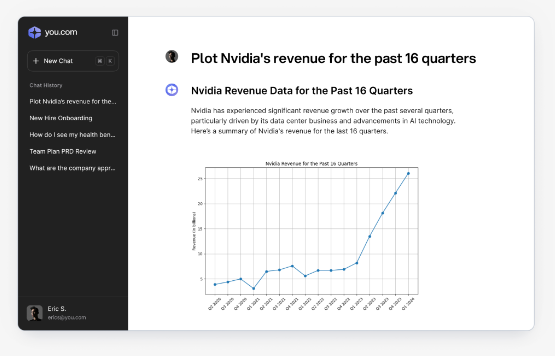You.com, an AI-driven search and productivity platform, announced today that it has successfully raised $50 million in its Series B funding round, signaling a significant transformation in the enterprise AI sector.
This round of funding was led by Georgian, with participation from tech giants and investment firms such as Nvidia, Salesforce Ventures, and Day One Ventures, bringing You.com's total funding to $99 million. This not only reflects the urgent market demand for AI solutions that significantly enhance workplace productivity but also underscores You.com's strong potential in this field.

Founded in 2021 by Richard Socher, former Chief Scientist at Salesforce and an expert in natural language processing, You.com is pioneering a new category of "productivity engines" in the AI space. These tools aim to revolutionize how knowledge workers interact with information and handle complex tasks.
In an interview with VentureBeat, Socher explained that the founding vision of You.com was not just about search but about redefining the starting point of everyone's online journey. Currently, You.com has helped millions of knowledge workers increase their productivity through research analysis, problem-solving, and content creation.
You.com's versatile AI platform enables users to perform a variety of tasks, from mapping financial data to exploring complex scientific concepts. The platform's interface allows users to seamlessly switch between different AI models and create custom agents, reflecting the company's vision for a comprehensive "productivity engine" in enterprise environments.

Since its launch, You.com has served over 1 billion queries and achieved a 500% revenue growth since January of this year. This rapid growth occurs as enterprises struggle with the "AI deluge"—the proliferation of different AI tools and subscriptions within organizations.
To address this challenge, You.com offers access to multiple leading AI models through a single platform and enhances real-time web access capabilities. The company places a strong emphasis on accuracy, a key factor in enterprise adoption of AI.
Socher explained that while it's easy to prototype quickly using large language models (LLMs), ensuring accuracy at scale is difficult. You.com's focus is on making LLMs more trustworthy. In December 2022, You.com became the first consumer-facing LLM with internet access, providing up-to-date answers with verifiable references. Since then, the company has built a fully model-agnostic AI operating system to deliver the most comprehensive and accurate responses.
You.com's focus on accuracy sets it apart in a market flooded with AI solutions that often prioritize speed over reliability. The company's approach includes "research assistant" features that provide comprehensive reports with verifiable references and "genius assistant" capabilities that solve complex problems using Python code and reasoning chains.
Additionally, You.com is introducing "multi-person AI" features, expanding from individual productivity to facilitating team collaboration and sharing custom AI assistants within organizations. This strategic shift towards enterprise solutions is intentional, as Socher explained, aiming to provide a 10x better experience for knowledge workers in business.
The company's move to a consumption-based pricing model is another significant development. Socher believes this approach better incentivizes enterprise-wide AI adoption, ensuring the technology is fully utilized.
As the AI market becomes increasingly crowded, companies must differentiate themselves not just through technology but through business models that encourage widespread adoption and demonstrate clear return on investment. The broader context of this funding round is significant. With open-source AI models like Meta's Llama 3.1 and Mistral AI's products gaining attention, the differentiation of AI companies increasingly lies in their ability to create valuable applications and workflows on top of these models. You.com's focus on accuracy, customization, and productivity aligns well with this trend, potentially giving it an edge in the enterprise market.
However, challenges remain. You.com will need to compete with well-funded tech giants like Meta and Google, as well as startups like OpenAI and Anthropic that have existing enterprise relationships. The company must also demonstrate that its "productivity engine" approach can provide consistent, measurable benefits across different industries and job functions.
Looking ahead, Socher is optimistic about AI's potential to transform knowledge work. He believes that by 2025, we will be able to move from proof-of-concept to actual production workflows. While few jobs will be completely replaced by general AI, those using general AI will see productivity increases of 20%, 30%, or even 60%, and accomplish more. This is still very meaningful for many people.
As enterprises continue to navigate the complex landscape of AI tools and capabilities, You.com's bet on the "productivity engine" could position it as a key player in the next phase of enterprise AI adoption. The company's success will hinge on its commitment to delivering accuracy, customization, and tangible productivity gains in real-world business environments.
Socher predicts, "Ultimately, we will have more AI agents surfing the internet than humans, starting next year." If this vision materializes, it could mark a fundamental shift in how knowledge work is conducted and how businesses operate in an AI-supported future.










